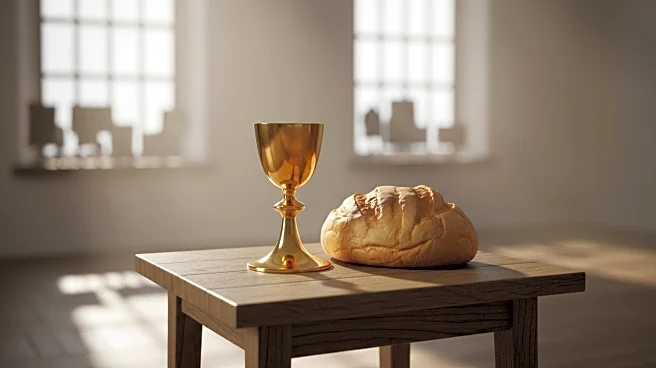What is the story about?
What's Happening?
A group of religious leaders, including Catholic priests and nuns, attempted to deliver Holy Communion to detainees at the U.S. Immigration and Customs Enforcement (ICE) processing facility in Broadview, Illinois. The request was denied by ICE, with no reason provided for the refusal. This facility has been the focal point of ongoing protests, with demonstrators clashing with federal authorities. The protests have intensified following President Trump's administration's deportation campaign, 'Operation Midway Blitz,' in the Chicago area. Despite the denial, the religious leaders held a communion service in the parking lot, expressing disappointment over the inability to provide spiritual support to detainees.
Why It's Important?
The denial of religious access to detainees highlights tensions between federal immigration enforcement and community groups advocating for detainee rights. The refusal to allow communion raises questions about religious freedom and access to spiritual care for those in detention. This situation underscores the broader conflict between immigration policies and civil rights, with potential implications for public policy and community relations. The protests reflect widespread opposition to aggressive immigration enforcement tactics, which could influence future policy decisions and community engagement strategies.
What's Next?
The ongoing protests and legal challenges may lead to further scrutiny of ICE's policies and practices. A temporary restraining order has been issued to remove a fence outside the facility, indicating potential legal battles over protest rights and facility access. Community groups and religious leaders may continue to advocate for detainee rights, potentially influencing public opinion and policy. The situation could prompt discussions on balancing immigration enforcement with civil liberties and religious freedoms.
Beyond the Headlines
The denial of religious access raises ethical questions about the treatment of detainees and the role of spiritual care in detention settings. It highlights the cultural and legal dimensions of immigration enforcement, potentially affecting long-term community relations and trust in government institutions. The protests and legal actions may contribute to broader debates on immigration reform and the protection of civil rights.

















